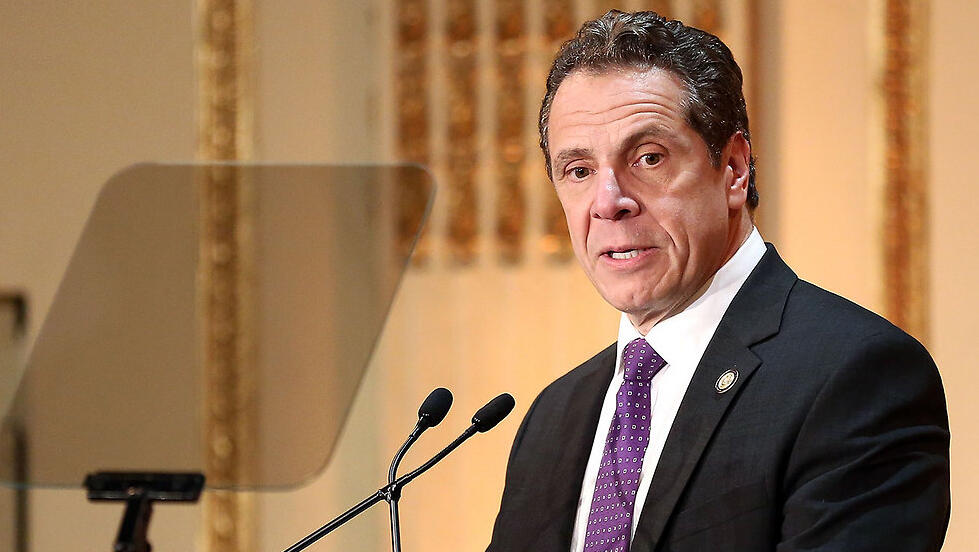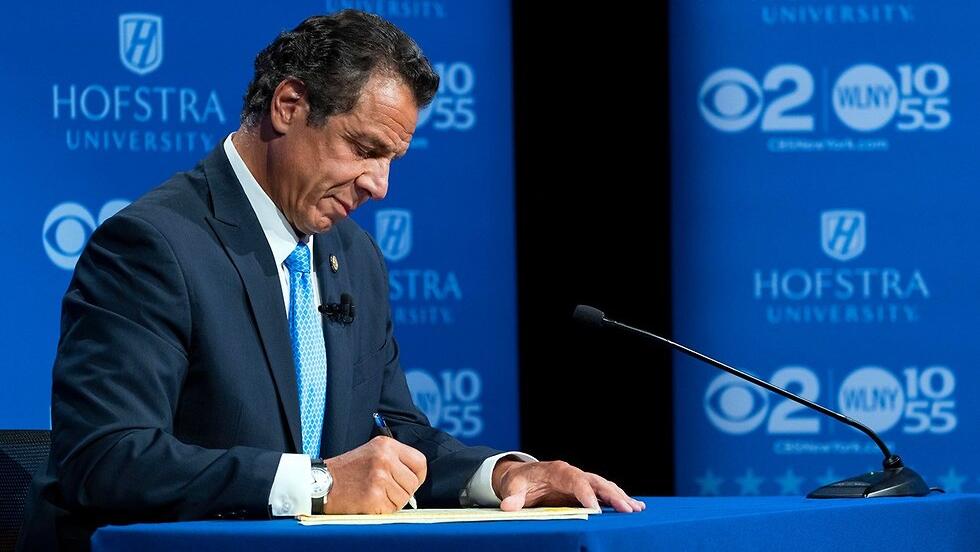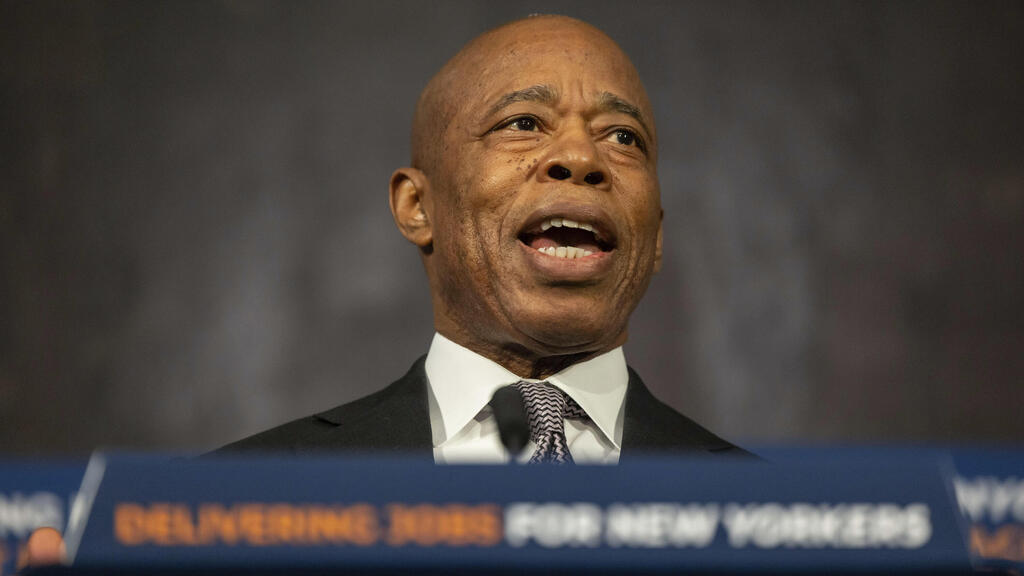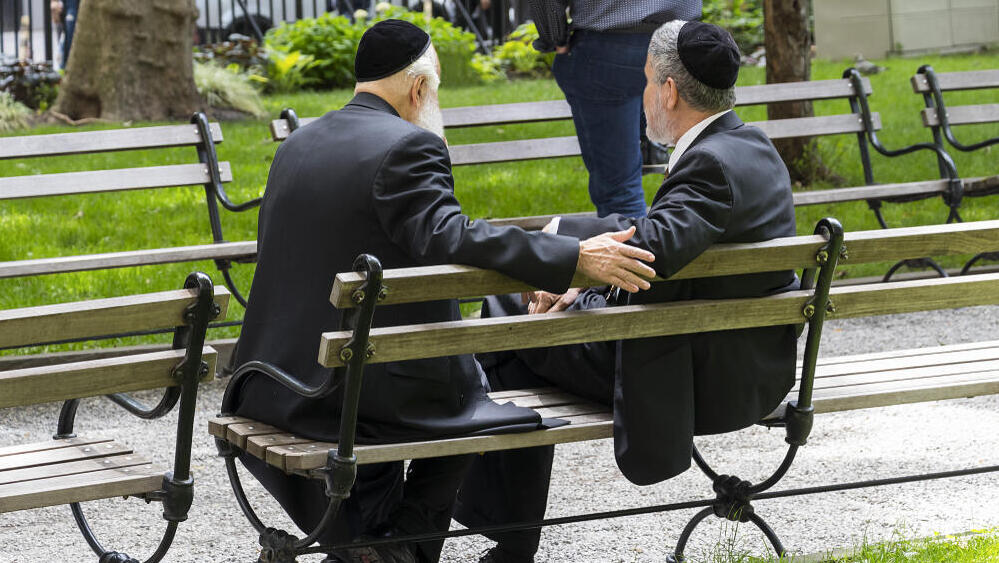Getting your Trinity Audio player ready...
Andrew Cuomo, the former governor of New York, has officially thrown his hat into the ring for the city’s mayoral race, marking an audacious comeback attempt three years after stepping down in disgrace.
His entry not only shakes up the race against incumbent Mayor Eric Adams but also provides a potential lifeline for pro-Israel voters, who had grown increasingly uneasy about Adams’ sinking approval ratings and the alternatives in the Democratic primary.
5 View gallery


Pro-Palestine protester in New York demonstration last week
(Photo: David Dee Delgado / Reuters)
Cuomo, long known for his aggressive political style, is stepping into a field where support for Israel has become a significant dividing line. As governor, he positioned himself as a staunch ally of the Jewish state, visiting Israel three times while in office and signing an executive order in 2016 barring New York from doing business with entities that support the BDS movement.
He reinforced this stance in 2019 when he ordered the World Trade Center to be illuminated in blue and white in honor of Israel’s Independence Day. More recently, he founded the “Progressives for Israel” group, calling himself “Shabbos goy” and explicitly challenging what he sees as a waning commitment to Israel among left-leaning Democrats.
“The Shabbos goy can do the work that benefits both the Jewish community and the non-Jewish community to speak out first and loudest against antisemitism”, Cuomo said.
Cuomo’s deep ties to New York politics stretch far beyond his own career. He is the son of the late Mario Cuomo, who served as governor of New York for three terms and was revered for his progressive vision and powerful oratory.
His brother, Chris Cuomo, is a former CNN anchor who was fired after revelations that he advised the governmor during his sexual harassment scandal. Despite these controversies, the Cuomo name still carries significant weight in New York’s political landscape, especially among older Democratic voters who remember Mario Cuomo’s legacy fondly.
Andrew Cuomo denies allegations of misconduct
(Reuters)
By contrast, some of Cuomo’s leading opponents in the race have taken a more critical stance on Israel. Among them is NYC Comptroller Brad Lander, a progressive Jewish Democrat who has consistently voiced opposition to Israeli policies and has aligned himself with the city’s left-wing activists.
Lander supported early cease-fire calls following the October 7 attacks and previously backed efforts to distance New York from corporations with ties to Israeli settlements. Another rising candidate, State Assemblyman Zohran Mamdani, has gone even further, openly endorsing the BDS movement and leading efforts to cut state funding to charities linked to West Bank settlements.
Get the Ynetnews app on your smartphone: Google Play: https://bit.ly/4eJ37pE | Apple App Store: https://bit.ly/3ZL7iNv
Mamdani's rhetoric following the October 7 massacre in Israel has alarmed Jewish leaders, who view his candidacy as a direct threat to the city’s traditionally strong support for the Jewish state.
Other candidates include Scott Stringer, the former city comptroller whose 2021 mayoral bid was badly hindered by allegations of sexual misconduct. Stringer, a Jewish politician with deep ties to Manhattan’s Upper West Side, has tried to rebuild his reputation and remains a formidable presence in the race.
Meanwhile, Brooklyn State Senator Zellnor Myrie is running as a progressive reformer, focusing on issues of racial justice and economic inequality. Though Myrie has not been as vocal as Lander or Mamdani on Israel, he has aligned himself with left-wing coalitions that have grown increasingly critical of the Jewish state.
For Adams, who has consistently branded himself as a friend of Israel and a defender of the city’s Jewish population, Cuomo’s entry into the race is a serious problem. The incumbent mayor’s tenure has been marred by declining public trust, federal corruption investigations, and increasing dissatisfaction over crime and housing costs.
While Adams remains popular in certain Orthodox Jewish communities that played a crucial role in his 2021 victory, his political troubles have left many in the pro-Israel camp searching for a viable alternative.
Cuomo is now positioning himself as that alternative. His campaign is expected to double down on his credentials as a law-and-order moderate and a steadfast supporter of Israel. He has already secured the endorsement of Rep. Ritchie Torres, one of the most vocal pro-Israel Democrats in Congress, who framed Cuomo as a necessary counterbalance to what he calls “radical elements” in the party.
The challenge for Cuomo, however, is that his past remains a political minefield. His resignation in 2021 followed multiple allegations of sexual misconduct, which he denies. He also faced criticism for his administration’s handling of COVID-19 in nursing homes, an issue that still lingers in the minds of many voters.
Some in the Orthodox Jewish community, in particular, have not forgotten how his restrictions on religious gatherings during the pandemic disproportionately affected their neighborhoods.
Yet, in a field where Adams is weakened and the alternatives include candidates with anti-Israel track records, Cuomo’s bid may resonate with voters who prioritize a strong pro-Israel stance. If he can successfully rebrand himself as the best option for the city’s sizable Jewish electorate, he may not only survive the political comeback attempt but reshape the race entirely.
The battle for City Hall is now a high-stakes contest not just for New York’s future, but for the broader fight over Israel’s standing within the Democratic Party. With Cuomo in the race, the city’s pro-Israel voters may find themselves with a powerful, if controversial, champion.









